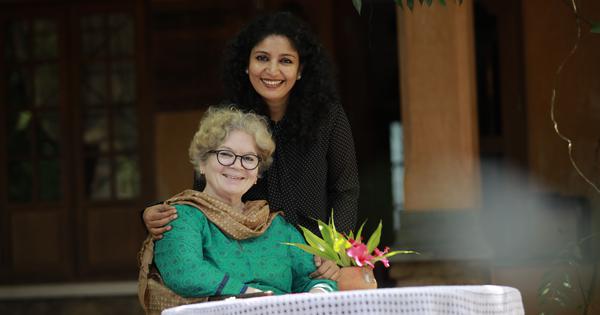
The wooden crates used to confine prisoners were made from thick logs, bound tightly with sturdy jute ropes. The crates were too cramped to stand in, too narrow to turn around. Ophir’s warriors dragged Emalath and Bithya by the ropes tied around their waists and kicked them into the crates. Emalath shouted, demanding to know what crime she had committed.
“Shut your mouth!” one of the soldiers snapped.
If she had not immediately lain down on the floor, a lance thrust through the bars would have pierced her neck. Two soldiers of Ophir – half-man, half-demon – entered the crate. They kicked Bithya, who lay clutching her child, and forced her to stand. After binding her and Emalath’s legs with a metal ring, they tossed the keys to the sentry and left. They took the light with them, plunging the space into darkness so thick it seemed it could be split with an axe. The guard moved back and forth like darkness stirring in the dark.
“Will they kill us?”
“Kill? Why?”
“I heard them talk. We are here for treason.”
“But what did we do?”
“Not us; it was you … you are the traitor. You begged from a foreigner. He treated your child. You along with him violated the rules of Sodom.”
“But … you know what I was going through …”
Emalath wondered how Ophir’s soldiers had learned the news. She had no idea how the spy-craft spread like wildfire.
Among Lot’s servants, those who sought refuge from unbearable poverty were the people of Sodom. The Eberites had always been with him. Two men from Sodom had accepted ten shekels of silver from Ophir to spy in Lot’s residence. When Lot gave them one bekah of silver, Ophir rewarded them with five times that for a single piece of hidden counsel. Yam Sover and his friend Azubah were those two spies. Yam Sover had told Ophir that Lot had broken the law by making the antidote for roshe, but he had no proof. He believed the matter involving Bithya’s child would provide the evidence he lacked.
“The child was dead. I can attest to that as a witness. Lot treated the child and brought it back to life,” he informed the authorities.
This was highly sensitive information. By the laws of Sodom, only the government had the exclusive right to produce, sell or administer roshe and its related treatments. Even the citizens of Sodom were forbidden to break this law. Any foreigner who dared question or challenge it faced capital punishment. How to kill was the only question that required careful thought.
“If they were to kill us, would it be swift?” Fear pulsed through Emalath, making her hair stand on end. “How swiftly would they be killing us? How painful would it be?”
Bithya shuddered, drawing the child tighter to her chest. Emalath had lost hold of her mind. She spoke without stopping. “They would hang us in public. How excruciating would it be? How violently would we shudder – if only for a moment? Or would they simply cut our throats?” She imagined the moment: kneeling, her head placed on the wooden block, the crowd around her cheering. A shiver moved down her spine. “Wouldn’t the block stink of blood by now? Saturated. Softened. Blood from so many. Would the surface be warm from the sun? Or cold? Rough or smooth? In those last seconds, head turned sideways on the wood, just before the axe comes down, perhaps all one thinks of is the chill of the blade. How sharp. How final. How gruesome. They say the executioners get a thrill from punishing women. Sometimes they tie them to horses, drag them to the gallows. Each leg of the woman would be tied to the tails of two different horses, which faced away from each other as the crowd shrieked, driving the horses in opposite directions. The woman would stretch between two worlds and would crack. Can one even fathom the pain when the body is split into two!”
“Lie still and be quiet, Emalath. You frighten me.”
But Emalath kept mourning. “My son – he will wear himself out with crying. That woman, my mother-in-law, having lost her sleep, would let her bitterness spill over, pulling him into it. She must be cursing me now. They do not know. They do not see me here, dying an innocent death. I have no abba, no ema to enquire where my body lies buried. No one on this earth to mourn an orphan. Jachin doesn’t know the truth about me. When they call me traitor and spit on my corpse, he will believe them. Will he want to spit on the face he once kissed? As my son grows, he will be belittled – his mother a traitor in their eyes. No one to tell him his ema was innocent. By then his father Jachin will be the husband of another woman, and the father of her son. My son will be condemned to days and nights of torment, whipped by his stepmother, forced to wash her clothes, clean the floor, carry water and stoke the hearth fire. He will endure sorrow-filled mornings, a motherless child’s grief and the tear-soaked nights of a son punished by his father. He will not sing beneath sun or moon. Flowers and birds will bring him no joy. His life will be worse than death.”
No matter how hard Bithya tried, she couldn’t stop Emalath from talking. She was frightened as well. The sentry pounded on the bars to warn them. Undeterred, Emalath kept speaking, voicing her complaints without pause, as if her relentless words could hold back the creeping fear of death. Her engorged breasts, heavy with milk long held back, began to throb.
Moisture soaked through her undergarments, spreading to the outer garments, saturating them as well. Gradually, it dripped to the floor, mingling with her tears.
“Asherah, cruel statue, I could not offer you sacrifice – I had no money. Are you punishing me for that? O mighty Baal, who favours the wealthy, I have always given what little I could – half a shekel of barley, one mina of silver – and placed it faithfully in your hallowed coffer, in the name of my son. And now, what fate awaits my poor child? Are you angry because I refused to offer my firstborn as sacrifice? Why should I continue to live then? How will they torment me? Will it be over in an instant, or will I endure a slow, agonising death, as day turns to cold, merciless night, suffering inch by inch?” Emalath cried, inconsolable. Fear gripped Bithya so tightly her body became rigid, unyielding. Her eyes were wide open to the darkness. She heard the footsteps of her husband, Gershon – a haunting presence she could sense even in a crowd. He was not dead. He was rising from among the dead. The moment he arrived, the termite-ridden earth crumbled. Owls hooted. Woodpeckers pecked with frenzied rhythm. “Please don’t come here,” she babbled, staring into the darkness. “Why should you face death twice?”
“You are rambling! Your nonsense is driving me mad.” Emalath swung her arm and hit Bithya. The metal rings clattered, drawing the attention of the sentry. He approached, holding a lamp that cast its glow over everything, revealing it all for a moment. He rapped the bars of the crate with his cane again.
“Oh Master, I have done nothing wrong,” Emalath pleaded. The sentry retrieved the lantern he had brought.
“If only he had kept that lantern there … it might have eased some of the fear – the dread that waits ahead. Are you not afraid, Bithya? We can keep staring into the lantern’s light, letting its warm glow push back the shadows in our hearts. It whispers of hope, urging us to hold on. On nights when I wait for Jachin, the lantern in my house tells me the same …”
She talked until her voice and saliva dried out, leaving only a faint, shrieking whisper. Exhausted, she finally leaned against Bithya’s body and fell asleep – the way people sometimes do, even in the midst of the greatest sorrow. Bithya held her close.
Emalath slept until Bithya tapped her awake. Outside the crate, a flood of light spilled in. The number of Ophir’s soldiers had grown. Bithya did not wake Emalath to witness it. Her child was suckling, eyes open now, moving arms and legs.
“Ashera!” Emalath cried. She kissed the child’s feet. In the next moment, the thought of her impending execution overwhelmed her.
The soldiers opened the crates and dragged the women out. “Walk,” they ordered.
Emalath believed they were being taken to the infamous killing grounds of Sodom, where the condemned were hanged in public. Dead bodies swayed from the gallows every day, a grim and constant sight. The wind cradled them, rocking them gently. People avoided the killing grounds, repelled by the overpowering stench that hung in the air. To the authorities, this foul odour was a warning – meant to remind all who might contemplate crime what awaited them.
But the soldiers did not lead them to the gallows. Instead, they brought them to Ophir’s house – a labyrinth of buildings and jutting structures. At the entrance, where darkness already claimed its victims, the soldiers blindfolded Emalath and Bithya. Emalath felt herself led up countless steps, down just as many, turning corners, moving through echoing corridors thick with silence. Death waited at the end of the path. She did not cry. She did not speak of innocence. Her lips sealed tight.
As the blindfolds were removed, they found themselves in a room flooded with light. Ophir sat regally on a high, throne-like chair, draped in shimmering black silk that matched the curtain behind him. His attire was the same deep, unrelenting black. The room held no other ornament. Emalath couldn’t see his face clearly, but she knew – he held supreme authority. In that space, Bithya felt death was the only certainty. Ophir pointed his sword towards Bithya’s child. A soldier snatched the child away as it began to cry. Bithya reached out instinctively, but soldiers grabbed her hands, tied them behind her, and warned her to stay silent.
Excerpted with permission from Stain, Sarah Joseph, translated from the Malayalam by Sangeetha Sreenivasan, Penguin India.
📰 Crime Today News is proudly sponsored by DRYFRUIT & CO – A Brand by eFabby Global LLC
Design & Developed by Yes Mom Hosting






